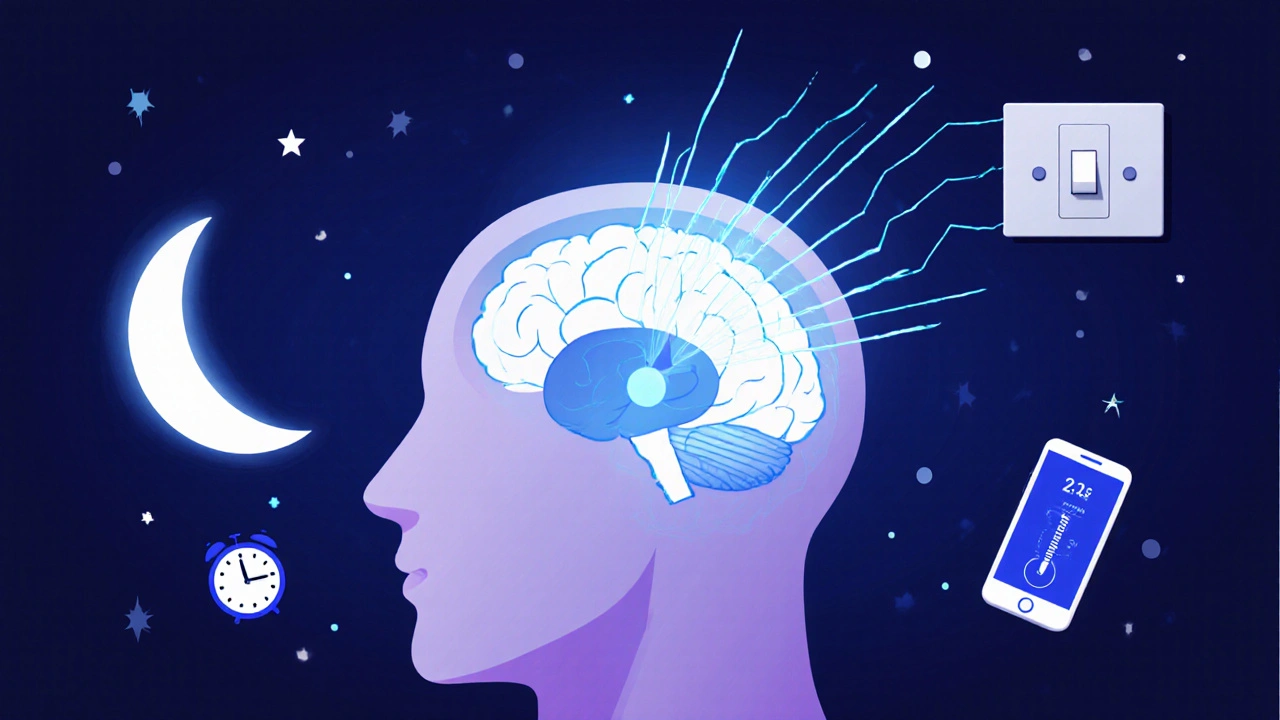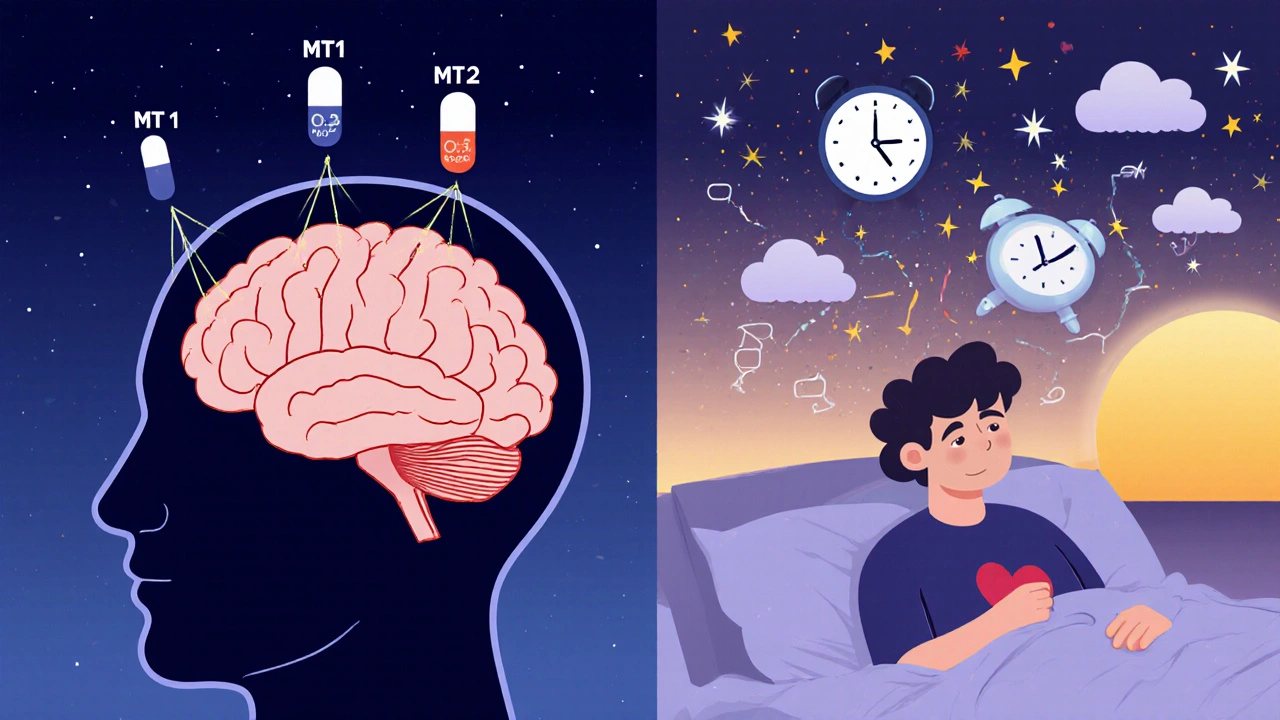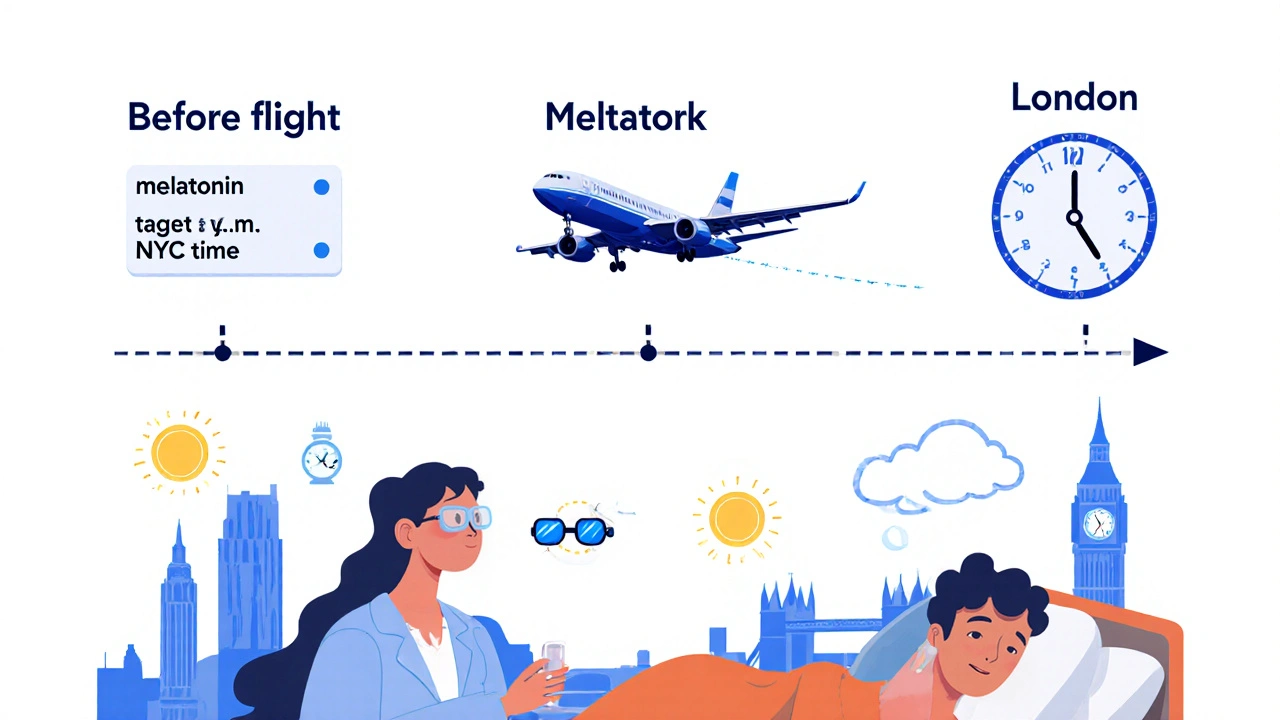Melatonin: How This Natural Sleep Hormone Really Works and When It Actually Helps
 Nov, 18 2025
Nov, 18 2025
Most people think melatonin is a sleeping pill. It’s not. It’s your body’s natural melatonin signal - a chemical that tells your brain it’s time to wind down. When you turn off the lights, your pineal gland starts pumping out melatonin. That’s how your body knows: night is here. But when you’re struggling to fall asleep, especially after traveling across time zones or working nights, you might reach for a supplement. The question isn’t whether melatonin works - it’s when it works, and how to use it so it doesn’t backfire.
How Melatonin Actually Works in Your Body
Melatonin isn’t a sedative like Ambien or Lunesta. It doesn’t knock you out. Instead, it’s a timing cue. Think of it like a dimmer switch for your internal clock. Your brain releases melatonin in response to darkness, usually starting around 9 or 10 p.m. Levels peak between 2 and 4 a.m., then drop as sunlight hits your eyes. That’s why sleeping with your phone on or leaving the lights on can mess with your rhythm - blue light from screens blocks melatonin production completely.
The hormone binds to two main receptors in your brain’s master clock, the suprachiasmatic nucleus (SCN). MT1 receptors make you feel sleepy by lowering your core body temperature by about 0.4°C. MT2 receptors adjust your internal clock, shifting your sleep-wake cycle earlier or later. That’s why taking melatonin at the wrong time can make jet lag worse instead of better.
Studies show healthy adults naturally produce between 0.1 and 0.3 milligrams of melatonin per night. But most store-bought supplements contain 1 to 10 milligrams - that’s 30 to 100 times more than your body makes. And that’s where things go off track.
What Melatonin Actually Does - And What It Doesn’t
Melatonin is most effective for circadian rhythm disorders, not general insomnia. Here’s what the science says:
- Jet lag (especially eastbound): Taking 0.5 to 1 mg at your destination’s bedtime for 2-3 days helps your body sync faster. Eastward travel (like flying from New York to London) is harder because you’re losing hours. Melatonin helps you fall asleep earlier.
- Delayed sleep phase syndrome (DSPS): If you’re always falling asleep at 2 a.m. and struggling to wake up, melatonin taken 2-3 hours before your target bedtime can shift your rhythm earlier by up to 40 minutes over a few weeks.
- Shift work: Workers on night shifts who take melatonin before daytime sleep may improve sleep quality slightly, but results are mixed.
- Primary insomnia: If you can’t fall asleep because of stress, anxiety, or poor sleep habits, melatonin has little to no effect. It doesn’t fix broken sleep hygiene.
A 2013 Cochrane review of 19 studies found melatonin reduces the time it takes to fall asleep by about 7 minutes on average. That’s not nothing - but it’s far less than prescription sleep aids, which can cut sleep onset by 20-30 minutes. The real power of melatonin isn’t in making you sleepy faster. It’s in making your body believe it’s nighttime when it’s not.
The Dose Trap: Why More Isn’t Better
The supplement industry sells melatonin in 3 mg, 5 mg, even 10 mg doses. But here’s the truth: your body doesn’t need that much. In fact, research from Oregon Health & Science University shows that 0.3 mg to 0.5 mg is enough to trigger the biological response. Higher doses don’t improve sleep - they just increase side effects.
People who take 5 mg or more commonly report:
- Morning grogginess (28% of users)
- Vivid dreams or nightmares (22%)
- Headaches (15%)
- Feeling “drugged” or out of sync the next day
On Reddit’s r/sleep community, 73% of negative reviews blamed high doses. One user wrote: “Took 10 mg to help with jet lag. Slept 12 hours and missed my flight.” Another said: “I took 5 mg at 11 p.m. and woke up at 4 a.m. with my heart racing.”
Why? High doses flood your receptors, causing them to become less sensitive over time. Some users report diminishing returns after just 4-8 weeks - a sign of receptor desensitization. That’s why experts like Dr. Neil Stanley, a UK sleep specialist, warn: “If you’re taking more than 0.5 mg, you’re probably wasting your money - and your sleep.”

Timing Is Everything
Getting the dose right is half the battle. Getting the timing right is the other half.
If you take melatonin at 11 p.m. but your body isn’t ready for sleep until midnight, you’re not helping your clock - you’re confusing it. The ideal time to take melatonin is 2-3 hours before your desired bedtime. For someone trying to fall asleep at 11 p.m., that means taking it at 8 or 9 p.m.
For jet lag:
- Flying east? Take melatonin at local bedtime (even if it’s 9 p.m. your body thinks it’s 6 p.m.) for 2-3 days before and after travel.
- Flying west? Take it at bedtime after arrival. No need to take it before - your body naturally wants to stay up later.
For DSPS: Take 0.5 mg at 7 p.m. for 2-3 weeks. Even if you’re not sleepy yet, your brain will start shifting. Within a month, you may find yourself falling asleep at 11 p.m. instead of 2 a.m.
Many people make the mistake of taking melatonin right before bed - thinking it’s like a sleeping pill. That’s like turning on a flashlight in a dark room and expecting it to be midnight. It doesn’t work that way.
The Wild West of Supplements
In the U.S., melatonin is sold as a dietary supplement under the 1994 DSHEA law. That means manufacturers don’t have to prove it’s safe or effective before selling it. There’s no standardization. A 2022 ConsumerLab analysis found that melatonin supplements contained anywhere from 83% to 478% of the amount listed on the label.
Some pills labeled “1 mg” had less than half that. Others had over four times as much. One brand claimed “5 mg” but contained 12.6 mg. That’s not just ineffective - it’s risky.
Compare that to Europe, where melatonin is a prescription drug. The only approved formulation is Circadin, a 2 mg prolonged-release tablet for people over 55. Even then, it’s only approved for insomnia - not jet lag or shift work. The European Medicines Agency requires strict quality control. In the U.S., you’re on your own.
Consumer Reports tested 20 top-selling brands in 2023. Only 28% gave clear instructions on when to take it. Most just said “take one capsule before bed.” That’s not helpful - it’s dangerous.
Who Should Avoid Melatonin
Melatonin isn’t safe for everyone. Avoid it if you:
- Are pregnant or breastfeeding (no long-term safety data)
- Have autoimmune diseases (melatonin can stimulate immune activity)
- Take blood thinners (it may increase bleeding risk)
- Have depression or bipolar disorder (it can worsen mood symptoms)
- Are under 18 (unless under medical supervision - long-term effects on developing brains are unknown)
Also, don’t use it as a long-term crutch. If you’re relying on melatonin every night for months, you’re masking an underlying issue - poor sleep habits, anxiety, light exposure at night, or a medical condition like sleep apnea.

What Experts Really Say
Dr. Kenneth Wright at the University of Colorado says: “Melatonin isn’t a sleeping pill. It’s a timing signal. If your clock is out of sync, it helps. If you’re just stressed, it won’t fix that.”
The American Academy of Sleep Medicine gives melatonin a conditional recommendation for delayed sleep phase syndrome and jet lag. For general insomnia? They say there’s not enough evidence to recommend it.
Dr. Alfred Lewy, who pioneered light therapy research, has shown that properly timed melatonin can shift your internal clock by 1-2 hours. But he also warns: “If you take it too late, you delay your rhythm. If you take too much, you overload your receptors. Most people do both.”
Alternatives That Work Better
If melatonin isn’t helping, here’s what might:
- Light exposure in the morning: Get 15-30 minutes of natural sunlight within 30 minutes of waking. This resets your clock better than any pill.
- Consistent sleep schedule: Go to bed and wake up at the same time every day - even on weekends.
- Reduce blue light after 8 p.m.: Use night mode on devices, or wear blue-light-blocking glasses.
- Cognitive behavioral therapy for insomnia (CBT-I): The gold standard for chronic insomnia. More effective than any supplement.
For jet lag, light exposure combined with low-dose melatonin works better than either alone. For DSPS, morning light + evening melatonin is the most proven combo.
Bottom Line: Use Melatonin Like a Tool, Not a Crutch
Melatonin is not a miracle cure. It’s a precision tool - like a wrench. Use it wrong, and you’ll break something. Use it right, and it can fix a timing problem.
Here’s what to do:
- Start with 0.3 to 0.5 mg - not 5 mg.
- Take it 2-3 hours before your target bedtime, not right before sleep.
- Use it only for circadian issues: jet lag, DSPS, shift work.
- Don’t use it every night. Try it for 3-7 days, then stop.
- Choose brands with third-party testing (USP, NSF, or ConsumerLab verified).
- Pair it with morning sunlight and screen reduction after dark.
If you’ve tried all this and still can’t sleep, see a sleep specialist. Melatonin might not be the problem - your sleep environment, stress levels, or an undiagnosed condition might be.
Melatonin isn’t the answer to every sleep problem. But for the right person, at the right time, in the right dose - it can be the missing piece.
Can melatonin help with insomnia?
Melatonin has little to no effect on primary insomnia - trouble falling or staying asleep due to stress, anxiety, or poor habits. It works best for circadian rhythm disorders like jet lag or delayed sleep phase syndrome, where your internal clock is out of sync. If your problem isn’t timing, melatonin won’t fix it.
Is 10 mg of melatonin too much?
Yes. The body naturally produces only 0.1-0.3 mg per night. Studies show 0.3-0.5 mg is enough to reset your clock. Doses above 1 mg don’t improve sleep but increase side effects like morning grogginess, vivid dreams, and headaches. Many supplements contain 5-10 mg - that’s not helpful, it’s harmful.
When should I take melatonin for jet lag?
For eastward travel (e.g., New York to London), take 0.5-1 mg at your destination’s bedtime - even if it’s early for you - for 2-3 days before and after your trip. For westward travel (e.g., London to New York), take it at bedtime after arrival. Don’t take it before you leave - it won’t help.
Can melatonin cause dependency?
Melatonin doesn’t cause physical dependence like prescription sleep aids. But some people report reduced effectiveness after 4-8 weeks of daily use, likely due to receptor desensitization. It’s best used short-term (3-7 days) for resetting your rhythm, not as a nightly sleep aid.
Is melatonin safe for long-term use?
There’s no solid evidence that short-term use (weeks to a few months) is harmful. But long-term safety data is lacking, especially for teens and young adults. The FDA hasn’t approved melatonin for any use beyond temporary circadian adjustments. If you need it for more than a few weeks, talk to a doctor - you may have an underlying sleep disorder.
Why do some people say melatonin doesn’t work?
Most people take it wrong - too late, too high a dose, or for the wrong reason. If you take 5 mg at midnight to fall asleep, you’re not helping your clock - you’re confusing it. Melatonin only works if your body is ready to receive the signal. Timing and dose matter more than the pill itself.
Andrew Montandon
November 19, 2025 AT 23:47Okay, but let’s be real - most people don’t even know what ‘circadian rhythm’ means, and they’re popping 5mg like gummy bears before Netflix. I’ve seen folks take it at midnight and then wonder why they’re wide awake at 3 a.m. with dreams about flying squirrels. It’s not magic. It’s a signal. And if you’re blasting blue light from your phone while holding a 10mg pill, you’re basically yelling ‘NIGHT!’ at your brain while throwing a rave in your bedroom.
Start with 0.3mg. Take it 2 hours before bed. Turn off the screens. Go outside in the morning. That’s the real hack. Not the pill. The routine.
Sam Reicks
November 21, 2025 AT 19:18they say melatonin is just a signal but what if its a government tool to control our sleep cycles so we dont think too much at night lol i mean why would they make it so easy to buy if it wasnt part of the agenda? also i read somewhere that the pineal gland is the third eye and that its been targeted by 5g and fluoridated water so maybe its not the dose its the contamination
Chuck Coffer
November 21, 2025 AT 23:19So let me get this straight. You’re telling me the solution to modern insomnia is… not taking a giant pill at bedtime? Shocking. I’m sure this will revolutionize sleep science. Next you’ll tell me that drinking coffee at 9 p.m. isn’t a good idea. Or that staring at a phone for three hours before bed might have consequences. Who knew?
Meanwhile, people are still buying 10mg bottles labeled ‘natural’ like it’s a herbal tea and not a hormone grenade.
Derron Vanderpoel
November 23, 2025 AT 00:37OMG I JUST REALIZED I’VE BEEN DOING IT ALL WRONG 😭 I’ve been taking 5mg at 11pm like a zombie trying to force sleep and waking up feeling like my brain was run over by a truck. I tried 0.5mg at 8pm last night and… I actually fell asleep before my brain stopped replaying that awkward conversation from 2017. I didn’t even need my weighted blanket. I just… drifted. Like a leaf. A very tired, emotionally exhausted leaf. Thank you for this. I’m not alone.
harenee hanapi
November 23, 2025 AT 05:39Everyone is so obsessed with melatonin but nobody talks about how much it messes with your emotions. I took it for jet lag and suddenly I was crying during a commercial for dog food. I felt like my soul was being rewired. And then I read online that it can make depression worse - which is ironic because I took it because I was too tired to feel sad. Now I’m tired AND sad AND confused. Who even designed this? Why is it sold next to gummy vitamins like it’s candy?
Christopher Robinson
November 24, 2025 AT 04:58Biggest takeaway: Melatonin is like a remote control for your internal clock - not a power button. 🛌⏰
If you’re taking more than 0.5mg, you’re not helping your sleep, you’re just training your brain to ignore the signal. And if you’re taking it at midnight? You’re basically sending a ‘goodnight’ text at 3 p.m. - it’s just not the right time.
Also, morning sunlight is FREE and works better than 90% of supplements. Go outside. Look at the sky. Let your eyes drink the light. Your circadian rhythm will thank you. 🌞💛
James Ó Nuanáin
November 24, 2025 AT 22:00It is truly lamentable that in the United States, a substance of such profound neurochemical significance is commodified with the same lack of oversight as artisanal kombucha. In the United Kingdom, melatonin is classified as a prescription-only medicine, and its administration is governed by stringent clinical guidelines. One cannot simply purchase a 10-milligram dose from a gas station next to energy drinks and protein bars. This is not a dietary supplement; it is a hormonal modulator. The American regulatory framework, in its current iteration, is a dereliction of public health duty. I am appalled.
Nick Lesieur
November 25, 2025 AT 10:38lol i took 10mg once bc i was ‘stressed’ and woke up at 4am with my heart pounding like i’d been chased by a bear. turned out i was just dehydrated. also my dreams were about talking squirrels who told me the government was hiding the real sleep cure in a secret bunker under disneyland. melatonin is not the problem. its the people who think its a magic sleep fairy.